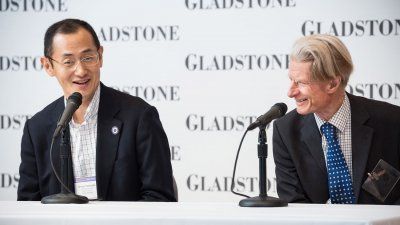University of California San Francisco
Give to UCSF-
-
UCSF to Conduct Online Survey to Assess Campus Experience Relating to Respect, Diversity and Inclusion
<p><span>Beginning November 5, UCSF will join the University of California system to survey all faculty, staff, students and trainees about their experiences with campus climate relating to respect, diversity and inclusion.</span></p>

-
Cancer Breakthroughs Meet Market Realities
-
Asia Battles Drug-resistant Malaria
-
UCSF Spinout Principia Biopharma Thinking Big and Covalent
-
To Treat Emotional Toll of Medical School, Physician Prescribes Shakespeare
<p>Students may begin their medical school careers riding on a cloud of altruism and goodwill, but it’s not long before the grueling schedule, avalanche of new vocabulary and stubborn patients can take a toll. UCSF's David Watts, MD, argues that a healthy dose of literature – poems and stories, specifically — be a core part of the student experience.</p>

-
San Francisco Giants Parade to Affect Transportation on Wednesday
<p>Transportation and traffic in around San Francisco will be affected as the Giants victory parade will be held Halloween day, Wednesday, Oct. 31.</p>

-
New Research Development Office Aims to Foster New Collaborative Research Teams Across UCSF
<p>UCSF is launching a new effort to boost research development to help the University’s scientists better compete in an increasingly complex funding environment.</p>

-
Carson Man Needs Help Funding Lung Transplant
-
Smoke-Free Laws Are Saving Lives
-
AIDS Treatment Pioneer Reflects and Looks Forward
-
In Aftermath of Sandy, Donations Pour in to American Red Cross
<p>Members of the UCSF community who want to show support for the relief and recovery of victims from Hurricane Sandy may give to the American Red Cross through Causes.com.</p>

-
After Smoking Is Banned, Heart Attacks Drop
-
Gladstone President to Receive Prestigious Pacesetter Award
Gladstone President R. Sanders "Sandy" Williams, MD, a professor of medicine at UCSF, will receive the ARCS Foundation’s 2012 Pacesetter Award next week for his lifelong dedication to furthering education and his extensive contributions to science and medicine.

-
Smoking Bans Cut Number of Heart Attacks, Strokes
-
Amenities at New UCSF Medical Center at Mission Bay Offer Something for Everyone
<p>For the children, women and cancer patients who will be treated there, UCSF Medical Center at Mission Bay will be an invaluable resource offering groundbreaking care for patients and a full range of amenities for their visiting family members.</p>

-
San Francisco - New Diabetes Minor at UCSF School of Nursing
-
Nobel Laureates Yamanaka and Gurdon Meet on UCSF Campus for Stem Cell Symposium
<p>Weeks after winning the 2012 Nobel Prize in Medicine, Shinya Yamanaka, MD, PhD, and John Gurdon, PhD, were able to celebrate their monumental achievement together for stem cell discoveries made half a century – and half a world – apart.</p>

-
Schools Missing Mark on Drinking Water
-
Hospital Promotes Healthy Living with Celebrity Chef's Help
-
Scientists Collaborate to Block Toxic Protein that Plays Key Role in Lou Gehrig's Disease
Scientists at the UCSF-affiliated Gladstone Institutes and the Stanford University School of Medicine have discovered how modifying a gene halts the toxic buildup of a protein found in nerve cells. These findings point to a potential new tactic for treating a variety of neurodegenerative conditions, including amyotrophic lateral sclerosis (ALS, or Lou Gehrig’s disease).

-
Bay Area Science Festival Culminates at AT&T Park on Saturday
<p>AT&T Park – home of the World Series champions, the San Francisco Giants – will become a science wonderland when the Bay Area Science Festival concludes again with a free science extravaganza on Saturday, Nov. 3. </p>

-
Obese Teens Face Higher Risk for Kidney Disease: Study
-
Gladstone, Stanford Research Offers New Game Plan for Drugs Targeting Lou Gehrig's Ddisease
-
Chef Shows How to Put Health on the Menu
-
Will You Survive the Zombie Apocalypse?
-
Are You On It?
-
Open-source Science Helps Father's Genetic Quest
-
UC Open Enrollment Period for 2013 Set to Begin
<p>The University of California’s Open Enrollment period begins next week, with some important changes coming to Health Net coverage affecting employees in San Francisco.</p>

-
UCSF, John Muir, SF VA and Kaiser Lead Bay Area Organic Produce Push